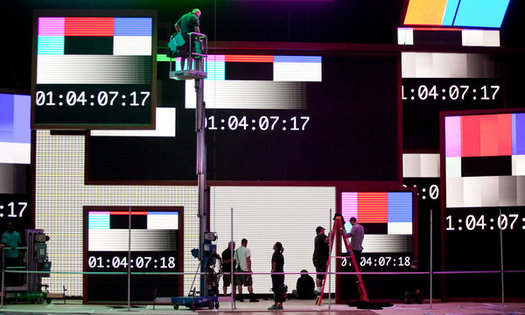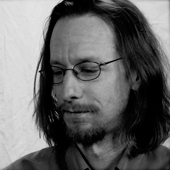
By Edward Linsmier for The New York Times, via The New Aesthetic
I watched a bit of the Republican convention last night. I wasn't really there to evaluate the content, though. I was there to consider the "optics."
“The buzzword of the day was ‘optics,’” Alessandra Stanley noted yesterday in her coverage of the coverage of the non-first-day of the Republican convention — and boy was that right. Monday's convention schedule was scrapped, so not much was happening as a hurricane barrelled toward New Orleans, and the specific concern was split-screen television coverage of a celebration and a disaster. "Optics" emerged as the term of the moment for discussing this scenario.
Politico published a handy compilation of 13 recent quotes involving this use of “optics,” several of which cite the split-screen coverage scenario explicitly. “Images of revelry by Republicans at a time of suffering by other Americans — no party wants those optics,” political consultant Steve Schmidt told The Times. A Republican official in Florida explained on CNN, according to Politico, that this possibility will in effect guide adjustments to the convention itself: “From an optics and a theater perspective, this is going to have to be on a day-to-day basis. We have to be mindful, obviously, of people’s homes and people’s lives.”
Clearly this use of “optics” is distinct from the word’s definition. So what does it (now) mean? David Gregory appears to have come closest to defining the term when he referred to “the optics of this, the politics, the perception.”
It seems clear that the notion of optics is tied to that of pseudo-events, the term introduced by Daniel Boorstin half a century ago to describe, well, things like today’s political conventions: completely staged, meticulously crafted happenings, designed to attract media coverage. But considering the optics does not seem to entail digging behind the facade — pointing out real facts and reference points obscured by surface aesthetics, as, for instance, Mark Lamster does in this recent Design Observer post on the convention's set.
Maybe the optics idea can be said to address both the planned surface aesthetics of a pseudo-event and the mediated surface aesthetics of a pseudo-event: How it was staged vs. how it actually plays. For all the thought and money and expertise involved in devising the look, feel, and tone of the Republican convention, its aesthetic masterminds did not, one assumes, count on a simultaneous hurricane. The intended message of a pseudo-event can be rendered totally irrelevant by its “optics,” not by way of a revealed deeper set of facts, but by collision with unrelated mediated imagery.
All of which sounds absurdly removed from reality, and that’s because it is. But those who find themselves discussing, analyzing, or attempting to create pseudo-events need a word like optics. A campaign expert would be unlikely to say “no party wants those aesthetics,” because that sounds faintly academic, pointy-headed. On the other hand, a party operative or even a political journalist would probably prefer not to talk explicitly about “image,” because it too bluntly suggests the lack of substance in the thing being talked about — and for that matter the act of talking about it.
But optics sounds vaguely complicated, like some concrete thing to be analyzed, assessed, manipulated, controlled. It has a wonky, insider-ish, expert air to it. It sounds important, substantial, real. And it is used to signal that mediated visual culture is being taken seriously, when in fact the subject is being trivialized. Optics is a pseudo-idea, but it’s one that plays well.
The word has, you could say, good optics.


Comments [5]
By the way: it's no coincidence that the hurricane Isaac is coinciding with the Republican convention. It's God's way of punishing them for denying climate change.
08.29.12
04:42
Meanwhile two other follow-ups from Twitterland:
Thanks, @GautamRamdurai for this image macro:
https://twitter.com/GautamRamdurai/status/240876669395673088
And thanks to @AmbivalentGeek I now realize there's a hashtag for this subject: #optics. Of course there is! It's pretty much the perfect hashtaggable notion, no?
https://twitter.com/AmbivalentGeek/status/240869344576425984
08.30.12
08:30
William Safire also noted the trend “ ‘Optics’ is hot, rivaling content” in his final On Language column and Ben Zimmer wrote about how optics achieved buzzword status in NY Times.
(click on image above)
Lettering by Thomas Kim
Thank you Rob
08.30.12
11:01
(click on image above)
The pseudo-event of Clint Eastwood, the RNC “mystery” speaker, using an empty chair to symbolize President Obama during his speech. But Obama’s official account got the last word. “This seat’s taken,” it said, adding a photo of Obama sitting in a chair emblazoned with the words “The President.” http://OFA.BO/c2gbfi , pic.twitter.com/jgGZTb02
08.31.12
03:47
09.06.12
01:24